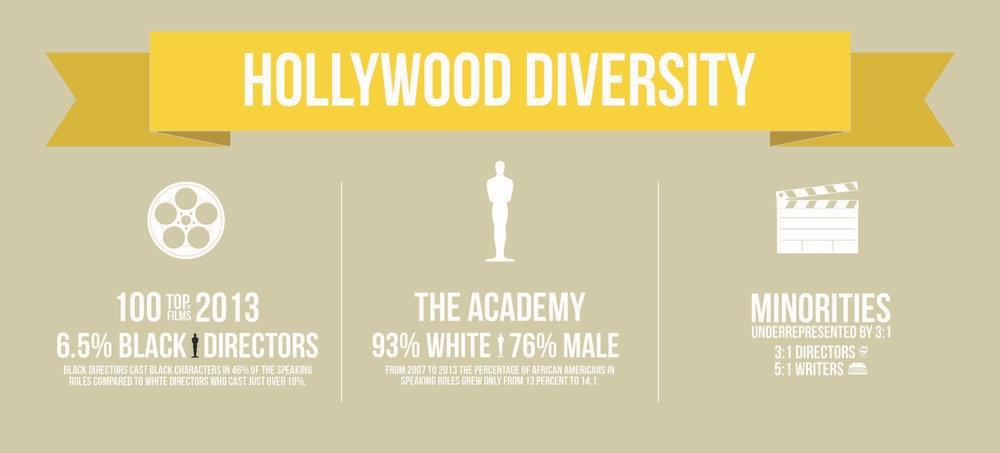by Whitney Carter
Opinions Editor
For the first time in nearly two decades, the Academy Award nominations for 2014 did not include a single acting nominee that was a person of color. There were only two people of color nominated, both for Selma in the categories of Best Picture and Best Original Song.
This feels like an incredibly important time for Hollywood to emphasize its commitment to diversity and yet it falls short on that effort. They have gone backward in their efforts.
We live in a time that has been heralded as a “post-racial society.” However recent national political events and the current state of our media have proven that we still have significant strides to make towards true equality. Hollywood represents an area of concern as well as areas of opportunity that could be used to further progress.
“We, as black people, have been celebrated more for when we are subservient, when we are not being leaders or kings or being at the center of our own narrative,” David Oyelowo said during an appearance at the Santa Barbara International Film Festival.

I am not sure I would go as far as Oyelowo, who played Martin Luther King Jr. in the recent box office hit Selma. Although, looking at the recent trends, there appear to be a lot more characters in those positions that have nominations and wins; Octavia Spencer in The Help and Lupita N’yongo in 12 Years a Slave as examples.
Hollywood has a diversity problem. The recent 21st annual “Hollywood Issue” of Vanity Fair is known to represent the big Hollywood actors and actresses of the year; they often choose a diverse range of actors regardless of nomination status. However, this year, they featured only two actors of color, including Oyelowo.
It is important to note that the television industry has made significant strides in the area of representation. There are numerous examples of men and women of color on television in positions of power and influence. People of color are being shown as lawyers, doctors and other professionals.
The TV show Blackish features African American leads and a mostly African American cast. Broadcast comedy and drama casts are much more racially diverse than film casts according to 2014 diversity report created by the Ralph J. Bunch Center for African American Studies at UCLA. Empire has become a runaway hit featuring a mostly African American cast, proving that, contrary to popular belief, both white and black people will watch a show even if it has mostly black people in it. Also proving that black people can carry a television show and it can be profitable.
At the same time, movies like Selma and 12 Years a Slave have proven to be box office successes but Hollywood still struggles to increase diversity both in front of and behind the camera. “The idea that there is a necessary trade-off between diversity and excellence has enabled the status quo,” according to the 2014 diversity report.
The hashtag #OscarsSoWhite was quickly trending after the Oscar nominations came out and the incredibly dearth of diversity was noted. The president of the Academy of Motion Picture Arts and Sciences, Cheryl Boone Isaacs, was quick to highlight the Best Picture nod accorded to Selma.
“What is important not to lose sight of is that Selma, which is a fantastic motion picture, was nominated for best picture this year, and the best picture category is voted on by the entire membership of around 7,000 people,” Boone Isaacs said.
It is important to note that these decisions are made by the academy, who are predominantly made up of white men. In 2013, the L.A. Times discovered that the academy was 93 percent white and 76 percent male. This begs the question, how much are member demographics affecting what accolades are given during award season? And how long are we willing to stand for such a lack of recognition for talent because of skin color?
The Best Picture nomination is incredibly significant, but for only two people of color to be nominated for awards seems like a grave misstep in a time where the area of race is turbulent in America. We would do well to encourage more diversity within the academy as well as speak with our dollars and watch movies that uplift cultures that are not in the majority.
Contact Whitney Carter at wcarter16@my.whitworth.edu






